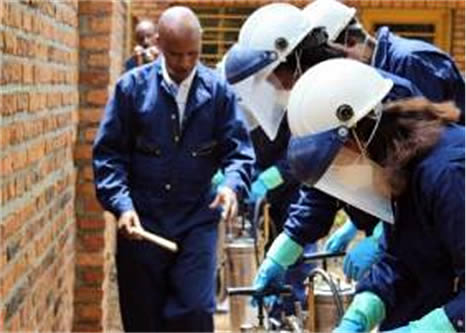
In Rwanda, spray operators learn how to pressurize the spray pumps that are used to apply insecticides to walls during indoor residual spraying (IRS) operations. Credit: AIRS Rwanda
PMI trains district government and hospital staff to plan and conduct IRS in Rwanda
Indoor residual spraying (IRS), a highly effective malaria prevention measure, requires complex planning and implementation on the part of governments and hospitals, particularly at the district level. Strengthening the capacity of national malaria control programs in Africa to manage IRS programs is a key component of the PMI-funded Africa Indoor Residual Spraying (AIRS) project.
In February 2013, AIRS, the Rwandan Ministry of Health’s Malaria and Other Parasitic Diseases Division (MOPDD, and PMI initiated a country capacity assessment of IRS planning and implementation for Rwanda, which led to a capacity development plan. This plan included training to strengthen the skills and knowledge of a broad range of IRS stakeholders. From May-July 2014, in collaboration with the MOPDD and with PMI’s support, AIRS conducted five trainings for more than 150 key stakeholders in IRS planning and implementation, monitoring and evaluation, logistics, and procurement at both district hospitals and health centers in three districts where IRS is implemented (Bugesera, Gisagara, and Nyagatare).
Emmanuel Hakizimana, the Director of Vector Control at the MOPDD said, “We are now at a stage where district hospitals should take the lead role in the implementation of IRS in collaboration with sector authorities and MOPDD; hence the importance of these training sessions. The future demands that districts implement IRS”. He stated that the training laid a solid foundation for more effective and efficient monitoring and supervision of IRS activities by district hospitals.
Dr. Ndagijimana Sylvestre, Director of Kibilizi Hospital, said, “This training has helped me and the rest of the participants in better understanding IRS, the systematic monitoring and evaluation of processes and outcomes, which allows for timely detection of gaps and constraints and ensuring that adequate responses are taken within the required time”. He also shared that for ownership and efficiency, hospital personnel such as procurement officers and the officer in charge of stores will also participate in the next IRS supervision to better understand IRS and to familiarize themselves with commodity tracking tools and how to handle insecticides and protect the environment.
